Chris Baty's Blog, page 239
April 28, 2012
Your Friendly Neighborhood Script Frenzy-Hero
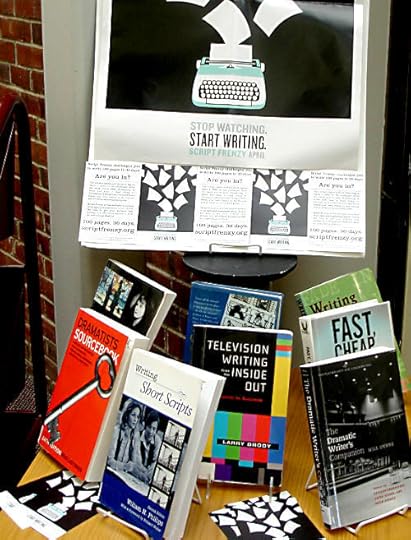
Hillary, Script Frenzy ML for New Jersey here. OLL asked me to stop by and talk a little about why my area is so much cooler than… er… I mean, to talk about some of the things we’ve been doing here in the Garden State to keep the Screnzy magic alive throughout the whole month.
Script Frenzy is such a newer event than NaNoWriMo, and many areas (mine included), are really spread out, making it harder for MLs and participants both to feel like they have that same connection with their region, even if local events are less, well, local. I thought I’d share a few things we’ve been doing here in NJ to make our spread out community feel a little more closely knit.[[MORE]]
Online write-ins and region vs. region word wars.
We’ve got a simple Java chat room and, while it’s open informally 24/7, we have scheduled online write-ins every Monday and Wednesday night. But, to keep it fresh, we decided to challenge our neighboring regions for some Wednesday Word Wars of the Week.
We invited Philly, NYC and Pennsylvania into our arena of battle and took them each on word-o a word-o over the last three weeks. The chance to beat our tri-state rivals really gave everyone that extra push to write more pages than ever before!
Our final online write-in of the year will be Monday (4/20) where will be writing from 8:30 PM EST until Screnzy ends at midnight and anyone is welcome to join us for this final word burst no matter what region you’re in.
We have amazing library partners .
Guys, libraries are awesome. The pictures in this post are from the Morris County Library’s yearly Script Frenzy display (they do a great NaNoWriMo one as well) and our newest partner, the Rockaway Library, not only donated an awesome private room for our kick-off party and weekly write-ins this year but also brought us cookies! Did I mention this room has a really random awesome fake fireplace? Because it does.
While a library event may not be local enough for everyone to attend, finding partners all over your region to host events or to just put up posters or displays is a great way to spread the sphere of welcome a little farther around the area.
(Remember: Anyone can set up library partnerships, not just MLs. Check out this page for more info.)
What cool stuff has been happening in your regions throughout the month to make everyone feel welcome to the Screnzy?
April 27, 2012
The Dream Team: A Q&A with Chris Baty and Jen Arzt
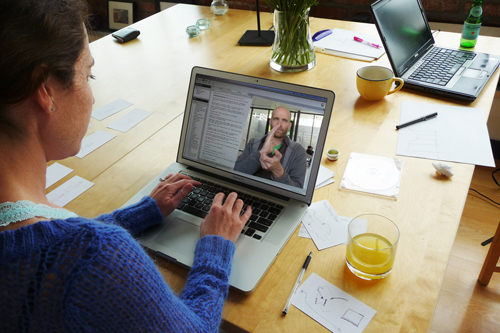
Way back in the day, when many of us were still young and naive, and all the cows in the world were calves, the Office of Letters and Light had an executive director by the name of Chris Baty, and a Script Frenzy program director moniker-ed Jen Arzt. These storied figures came together for this year’s Frenzy as one mega-writing-team, a scripting Megazord, if you will. Taking time from this meeting of their creative minds, Chris and Jen sent us this missive in which they interview each other about first kisses, wooden eyeballs, and the co-writing process so far:
Chris: This is the first time you’ve collaborated on a screenplay with someone. What important life lessons have you learned from working with me?
Jen: Coffee tastes better with a friend at your table.
Chris: Our screenplay is loosely based on an 1890s ghost story we made up involving a vanishing train and a seven-foot-tall murderer with a wooden eyeball. Neither of us knows anything about trains or wooden eyeballs. What were we thinking?[[MORE]]
Jen: What do you mean? My eyeballs are wooden. You haven’t noticed? Kidding! They’re glass.
I think the thing about writing is to imagine the world you’re creating as you want it to be, rather than try to match it to how it may have actually been. All we need to do is convince the reader that this can happen in the way we say. Real life reality doesn’t matter if we sell our imagined reality right.
Chris: We’ve been getting together twice a week to write. You always have headphones in while we’re working. Are the headphones even plugged in to anything? What are you listening to over there?
Jen: Ha! They are plugged and whispering all the time while we write. In no particular order: Frightened Rabbit, Cory Branan, Josh Ritter, Damien Rice, Magnolia Sons, and “Anna Sun” by Walk the Moon.
Chris: As of today, we are about five days behind schedule. How are we going to get caught up?
Jen: Umm? Start listing to faster music. Maybe add in some speed metal? Okay, now you. Our screenplay’s heroes are 14 years old. What is the most embarrassing thing that happened to you when you were 14?
Chris: Wow. Documenting the number of embarrassing things I did when I was a teenager would require a Lord of the Rings-length trilogy. One of my finer 14-year-old moments involved me writing a love poem and giving it, with great fanfare, to the first girl I ever kissed. She was too kind to point out the very obvious fact the poem consisted entirely of well-known Bob Dylan lyrics with her name tacked onto the end of key lines.
Jen: Our main female character has a traditionally male name. If you had a traditionally female name, what would it be?
Chris: My parents already gifted me with a gender-ambiguous middle name (Cass). This ensured plenty of character-building mockery on the playground when I was little. Maybe Hortense? Hortense Cass Baty. It’s got a nice ring, right?
Jen: If your life story were to be made into a movie, who would play you?
Chris: The first person who comes to mind is the Swedish Chef from the Muppets. If he weren’t available (or wanted too much money), is probably the only other dramatic actor alive with the dynamic range necessary for the part.
Jen: What will we do to celebrate hitting 100 pages before May 1?
Chris: We currently have a scene where the teens in our movie gather in a diner to figure out what they’re going to do next. Ever since we’ve hatched that scene, I’ve been hungering to go to a diner. Maybe we could get a cheeseburger with a hundred candles in the bun?
Chris Baty founded National Novel Writing Month in 1999; two years later, Chris co-founded Script Frenzy. Since January 2012, Chris has been working as a full-time writer and speaker. Chris is the author of No Plot? No Problem! and the co-author of the Ready, Set, Novel workbook. His freelance writing has appeared in the Washington Post, Afar magazine, the Believer, and Lonely Planet guidebooks. His quest for the perfect cup of coffee is never-ending and will likely kill him someday.
Jennifer Arzt holds an MFA in Film, Television, and Recording Arts, and is a writer, director, and producer. Her short films have appeared in festivals around the country and have earned awards, including the Directors Guild of America Student Film Award. She’s worked on various projects of varying sizes, and was the Program Director for the nonprofit event Script Frenzy in Oakland, CA.
April 26, 2012
Ten Ways Poetry Can Improve Your Prose
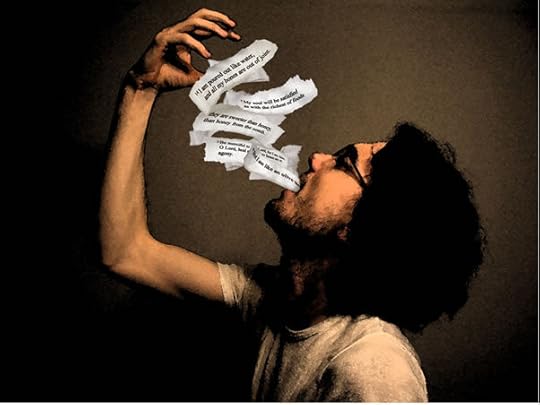
A few years ago, while plodding through a revision of my novel (revisions require the writer’s equivalent of heavy-duty hiking boots), I got bored by my writing. It was too literal, too realistic, too earnest, and too flat.
Most writers are all too familiar with this feeling after a red-eyed reading of a draft. I needed a way to literally jar my narrative sensibility. I needed jazz, punk rock, Jackson Pollock, Merce Cunningham, something.
Around this time, I read a quote by Emily Dickinson that remains among my favorite writing advice: “Tell all the truth but tell it slant.”
I started reading poetry avidly and discovered that by focusing on the exquisite “slant” poetry offers, the “truth” I was trying to capture became more piquant, surprising, nuanced, playful, and meaningful to me.
So, in honor of National Poetry Month and Poem In Your Pocket Day, here are my 10 reasons prose writers should read—and hopefully write—poetry.[[MORE]]
Mood: Many poems are almost incantations or prayers in the way they use techniques such as repetition and alliteration to establish atmosphere. Of the fiction writers who best use such techniques, I think most immediately of William Faulkner (who started out as a poet, and no, there’s no relation).
Mystery: In general, poetry is more focused on nuance, on the elusive gaps of life rather than on the objective connections that much prose is dedicated to. It’s easy for a prose writer to write toward linkages instead of writing toward the interludes where a different kind of tension resides.
Personification: Poetry gives life to inanimate objects in a way that fiction all too often doesn’t. Animating objects is a good exercise for any writer, but I think the applications for writers of science fiction, fantasy, and magical realism are endless.
Detail: Poets delight in specificity—in fact, you might say some poems’ narrative tension is formed around the drama of minutiae, forcing the reader to parse phrases as if reading with a microscope. As a writer who lacks Nabokov’s or Updike’s obsession with detail, poetry helps me pause and notice.
Sensory engagement: Poems are so often awash in sensory details, and details captured by all five senses, not just sight, which so many writers (including me!) can privilege. I cherish a good dose of synesthesia.
Brevity: Poetry is a craft of compression. Poems don’t have many pages to make a point, so their narratives tend to move through fragments rather than exposition. I love reading Kay Ryan’s miniatures or Basho’s haikus. Brevity inspires suspense.
Intensity: I think poems usually hit higher pitches than most prose, so fiction writers can benefit by studying how such intensity is created. I think of Gwendolyn Brooks, Sylvia Plath. What words, line breaks, rhythms, etc., produced a poem’s steeped moment? How can such intensity be captured in prose?
Exploration: I’ve never heard of a poet who uses an outline. I imagine poets to be more like jazz musicians, who wend their way through riffs to create, taking risks in their word choice and line breaks, and conceiving in the moment (like many Wrimos!). Kenneth Koch and Frank O’Hara write as if following their pen on a playful romp.
The art of play: Poetry, especially free verse, can be more playful than prose, which finds itself hemmed in by paragraphs and sentence structure. If you want outright surreal wackiness—to the point that every word in a poem surprises—check out Dean Young’s Elegy on a Toy Piano (the title tells it all).
Attention to language: It’s a cliché to say that poets paint with words, but they do. Poets strive to write against cliché—scrutinizing and challenging each word—and perhaps even creating new words, a la E. E. Cummings.
So my question is, do you read poetry? If so, how does it influence your writing? Share in the comments below.
– Grant
The Office of Letters and Light is celebrating Poem In Your Pocket Day (I’m carrying Elizabeth Bishop’s “One Art”) with our good friends the National Writing Project, the New York Times Learning Network, and Figment. Check out their poetry resources for more:
NWP’s Poem in a Pocket Activities
Ways to Celebrate National Poetry Month with the Times
Figment’s Poetry Page
Image by Josh Flores
April 25, 2012
NEO-Driven YWP Frenziers!

For all of our events, the Young Writers Program lends NEOs — small word-processing computers — to a few deserving classrooms around the country. We love to check in and hear about their progress. Laura Nicholson, the creative writing teacher at Huntley Project High School in Worden, MT, recently told us about what her students have been working on this April.
Who knew that writing a script could be such a hard process? My students chose to write their scripts in groups, since I have a creative writing class that consists of four sophomores, four juniors, and four seniors. Each class group has screamed, cried, laughed, forced, and written their way through a short film or stage script.[[MORE]]
The seniors have chosen to write a melodrama titled Back to Daisy. It’s a rip-roaring, Wild West adventure story where one outlaw gets out of jail only to find that the only way to the heart of our heroine, Daisy, is to get back to that jail. The juniors have written a Groundhog Day-esque story about a group of teenagers who find out their first day of school keeps repeating… And at the end of each day, the same girl is killed. The sophomores are writing a horror comedy about a very weird roommate named Mary Blood, and all the weird and horrible things that happen to them at their new house because of her.
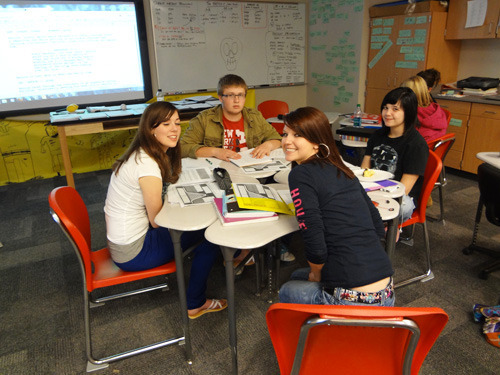
I think they are all surprised at just how difficult it is to write as a group, which is a good taste of what it would be like to be part of the screenwriting world of sitcoms or films. They all thought they were going to write more than they actually wrote and all have been a little frustrated with the process at times. However, I know they are enjoying the process. They love creating, they love writing, and they love that they are given the chance to actually write out an entire script, however short it may be.

One of the groups is filming their screenplay; one of the groups is performing it as a play; and one of the groups is doing a mock reading of it for the class. Hopefully, we can send you the screenplay as thanks to loaning us the NEOs. They LOVE having them in class—it would have been impossible to write without them. Our school is doing evaluation testing currently, and the computer labs are completely closed for all classes. The NEOs have been a lifesaver. Thank you!

– Mrs. Nicholson and the Huntley Project Creative Writers
April 24, 2012
Axe Cop: Classic Cameo by Ethan Nicolle
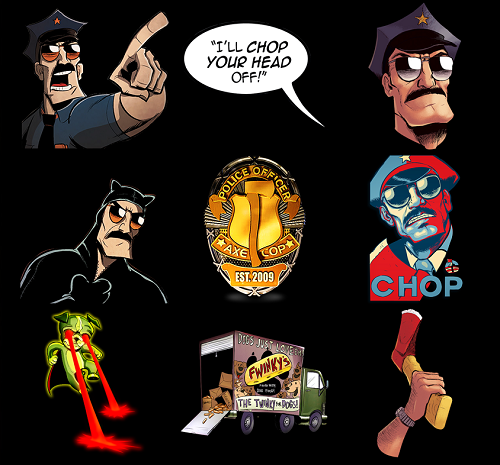
Have you heard the awesome news? Axe Cop is going to be a TV show! We’re incredibly excited and super happy for Ethan Nicolle, who created our favorite mustachioed officer of the law. Way back when, Ethan wrote a Cameo for Script Frenzy that was chock full of great writing advice, including insight into how to work with an established premise for a script. Not only that, he shared a few more doodles with us, too. Check all of that out below!
I create a comic called Axe Cop with my 5 year old brother, Malachai. He “writes it” and I turn it into a readable comic book. It’s a fun process and when Script Frenzy invited me to do a cameo article I figured this would be a good place to really talk about the process. One thing I want to make clear before I get into this is that I don’t want to take away from the fact that my little brother has a brilliant mind. He is a hilarious kid and he never ceases to amaze me with the things he comes up with. That said, turning a five-year-old’s ideas into something somewhat coherent is an art form all it’s own and it’s one I really have come to enjoy.[[MORE]]
I think I could best classify it as a form of comedy writing vaguely similar to what the guys on Mystery Science Theater 3000 do. The creator is given something that is conventionally ignored (they use bad movies, I use the insane ramblings of a five year old) then it is up to us to sort of re-present it in a new and entertaining way. This is something we have to do all the time in writing. A good story is always comprised of some cliches, so consider this a lesson in making the best of something you’re stuck with, even if it’s three act structure or a moral premise.
Something I love to do when I visit my (much) younger siblings is what I call “squiggle drawings”. They will draw squiggles in my sketch book and then I will try to turn these squiggles into imaginative creatures. The theory is that there is no wrong line, and I can make a fun piece of art out of anything I am given. Here are some of my favorite examples.






My approach to these drawings is the same as my approach to turning Malachai’s stories into entertaining comics. I think these principles could be applied to any situation where you are trying to write or visualize something that seems to be generic or lacking. These are some of the things I think about:
Think of the most obvious thing, then don’t do it: When I look at most of these squiggles, the most obvious thing almost always jumps out… usually it’s a worm. Whatever it is, I skip that thought and try to find the next idea. Same with when Malachai gives me his story, I think of the most obvious way I could present it, then throw that in the trash. It is easy to fall in love with an idea because you thought of it, but often you thought of it because it was obvious. This is not a rule, only a wise practice. Sometimes you will find that the obvious choice was the best choice, so in that case do the obvious thing, but not in an obvious way.
Play with the order: In the drawings, before starting I find objects that look like different things and I try to decided on three main “pieces” before I start to draw. Usually I find some sort of head, some sort of body, and some sort of foot or fin. When Malachai give me his stories he tells them all out of order. He overlaps himself and will retell one part a different way the second time he tells it. So I look at what I have and I try to find my beginning, my middle and my end. Usually I also try to find the “punch line.” I find what makes it a story and then I piece it back together
Give it flavor: Even if you go with the obvious choice, you must give it it’s own flavor. Give it it’s own little story. When Malachai gave me the character Uni-Man (a man who became so smart he grew a unicorn horn) I chose to make him a quiet, nerdy guy with a bow tie and curly mustache. I did not do the obvious thing and draw a super hero with a unicorn horn. In the snail drawing above, from the spiral line I was given a snail was the obvious choice, but I gave it it’s own flavor. This snail is some giant alien snail from some other planet, and while we do not understand exactly what is happening, we know something is going on, and we have been given more than just a snail, we have been given something with it’s own little story.
Treat it with respect: I think one of the things that draws people to the images above and to comics like Axe Cop is seeing an artist really treat with respect something someone would normally ignore. I did not just turn these squiggles into sloppy drawings… I went in and I made them into real pieces of art. Someone who does this kind of thing brilliantly is Dave Devrie’s on his site, Monster Engine . The scribbles and banter of a child is something that an adult usually stands above like a giant. But when you make yourself a pygmy and stand beneath life’s little things and look up, you often find yourself surrounded by a giant new world.
Have fun with it: Make this a high priority. The lesson I learned with Axe Cop is that, if it was fun for me to make, chances are it will be fun for others to read.
What you are starting out with may not be exciting or interesting, but don’t let that deter you from embracing it and making it your own. There is wonder in all things, you just have to be willing to seek it. As my favorite author, G.K. Chesterton puts it, “The world will never starve for want of wonders; but only for want of wonder.”
ETHAN NICOLLE is from a small town in Oregon, with no formal training in art, he first self published his own comics in high school. After working on obscure comic books like Creep and Puppet Terrors, and his own debut graphic novel the Weevil, Nicolle’s humor series Chumble Spuzz was picked up by Slave Labor Graphics. The series gave him the honor of special guest at the Alternative Press Expo in 2008, and was nominated for an Eisner Award for Best Humor Publication in 2009.
Image courtesy of AxeCop.com
April 23, 2012
I Had an Onion On My Belt
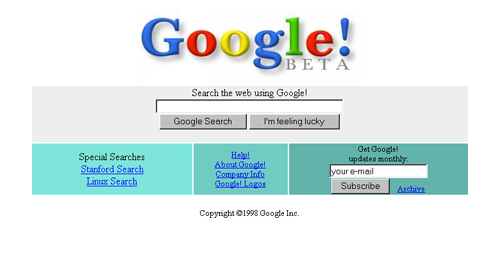
It’s hard not to sound like an internet hipster when I talk about the web. I’ve been a part of message boards and online communities since 1998 or so, and I am a bit prone to rolling my eyes when someone tells me about some newfangled thing they’ve just discovered online that I’ve been doing for the past ten years.
But I had a recent, slightly horrifying realization: I am in danger of going from internet hipster to internet fuddy-duddy. This occurred to me the day I said something along the lines of, “I don’t know about this Tumblr business. What can it do that Twitter can’t?”
Replace Tumblr with, oh, 8-tracks and Twitter with records, and I’m a grouchy old lady wanting to know what’s wrong with how we did things in my day.
[[MORE]]
I decided that 31 is too young to be old, so I’ve been making an effort these last few weeks to explore the newer parts of the Internet. I signed up for Tumblr. I subscribed to a bunch of YouTube channels. I’m still holding out on Pinterest, but I’ve convinced myself that’s due to my very non-visual nature (I’m a words girl) rather than my age.
But Twitter is still my first love, and I think I’m just going to have to come to terms with being a little bit stuck in 2009. Still, I’m going to try to stay on top of the new stuff, just to make sure I’m not telling anyone to get off my lawn quite yet. I’m not ready to be an internet has-been. Even though I remember the day the IT guy at work told me I should try this great new search engine called Google. How many of you remember life without Google?
What websites are the next big thing in your neck of the internet? And what virtual year are you trapped in?
(The title of this post is from one of my all-time favorite lines from The Simpsons, in which Grandpa Simpson is explaining how things were in his day. The fact that I had to explain that to those of you who weren’t allowed to watch The Simpsons when that episode aired is making me feel old. And the image is the Google logo from 1998, shortly before I started using it as my search engine.
Now you kids get off my lawn.)
- Sarah
April 19, 2012
The Age of Advice

Perhaps it is because we are in the middle of Script Frenzy and amazing industry-insider Cameos abound. Or because I am soliciting pep talks from beloved published authors (six have said “yes!”) to cheer on our November novelists this fall. Or because I am getting married in a few months, and am asking every friend, family member, delivery person, barista, neighbor, shrubber, and companion animal for their sagest relationship advice. Reasons aside, I am noticing a distinct uptick in the amount of interesting, varied, and uniformly valuable advice pouring into my skull on a day-to-day basis.
And that is just the solicited input! You can’t turn on the TV or open your mailbox or hop on the internet without being inundated with platitudes, suggestions, and admonitions for how to do something better, faster, longer, more mindfully, or with greater abandon.[[MORE]]
Apparently I need more (or less) vitamin B. I am too self-centered. I am not self-preserving enough! To thine own self be true. Do unto others… Share and share alike! Stop and smell the roses. “Life moves pretty fast. If you don’t stop and look around once in a while, you could miss it.” Or my most recent favorite (this on a T-shirt) “Life’s too short to eat crappy meat.” Amen!
And don’t even get me started on unsolicited wedding advice. Turns out the whole world knows exactly what the reception centerpieces should look like but me. (I hear from my elders and betters that this unsolicited advice thing gets worse when you have kids…)
So in the tradition of Too Much Advice (was that a Berenstain Bears book?), I am turning to you for more.
What words do you live by? And how do you internalize all the wisdom the world has to offer while filtering out the rest of the noise?
-Lindsey
Photo by Flickr user spratmackrel
April 18, 2012
Titanic 3D, same story but with more D's
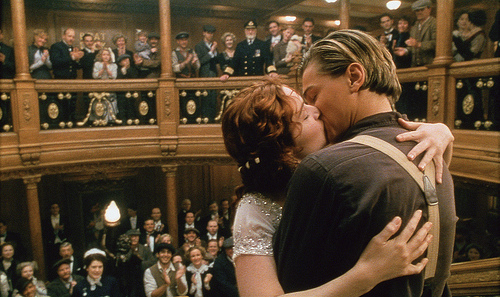
Last weekend, I had the pleasure of seeing Titanic 3D with a few friends. I was a little apprehensive about sitting through an almost three-and-a-half-hour movie that I’d already seen, but it ended up being well worth the whopping fourteen dollars. It was also my first experience watching a movie in 3D (not including Disneyland’s “Honey I Shrunk the Audience”), and although at first I found the glasses somewhat annoying and the effect a little distracting, I left thinking it was super cool!
The experience of watching Titanic again presented me with an opportunity to revisit something that I had first experienced in my childhood with fresh eyes. Even though I was only seven when Titanic was released, I can still remember “Titanic fever” and how crazy excited I was to see it in theaters with my family. With equal clarity I can recall the crushing disappointment I felt when, after stepping into the theater, my sister realized she was positively too scared to see it, forcing my parents to admit that Titanic was probably a “renter” (but not for them of course, they saw it the next night).
Although this was a blow, I didn’t miss out completely because after my mom saw it she spent the better part of the next morning telling my sisters and I the entire story with impressive accuracy; even James Cameron would have approved of her attention to detail. While she was telling the story I listened with wide eyes, and clung to every word. Even now I’m completely unable to divorce her version of the story from the actual film. I’ll never be able to watch the scene in which Jack teaches Rose how to spit like a man without picturing my mom’s ridiculous impression of Jack hocking a loogie. [[MORE]]
When Titanic was released on VHS and I finally got to see the real thing, I was blown away by the massive scale of the film, the wonderful melodrama of the romance, and Leonardo DiCaprio’s boyish charm. This is a tough reaction to match, so I was concerned that seeing Titanic again as an adult would be disappointing; but while it was a very different experience, for me, the general feeling was the same. I still can’t believe that anyone could afford to make the movie without completely relying on green screens. Even 15 years later, the elaborate sets, costumes, hundreds of extras, and special effects still look perfect.
The romance and the characters were a little less convincing as an adult, but it was hard for me to tell if that was because the dialogue was rote, or because I remembered the lines so well (I had to restrain my self from joining in when Jack shouted, “I’m king of the world,” and when Rose said, “I want you to draw me like one of your French girls”). And Rose’s fiancé Cal, and his valet struck me as a little too evil — like absurdly evil. Why would Cal give up his spot on a lifeboat just to try to kill a fiancée he never loved, and who would probably die anyway?! Come on, Cal! But there are other great characters that make up for the flat ones, including Kathy Bates’ character, the lovable and sassy women of “new money”.
But every hole and cliche I noticed was completely made up for by that gosh-darn excellent score. The music managed to bring me back to that state of awe I’d experienced as a kid, and enhanced my appreciation of the beauty in the tragic story. I still feel a pang in my heart at the moment when Kate looks up at Jack while being lowered into a lifeboat, and flares are exploding in the sky, and the music is playing — oh man, such a great scene.
I totally broke my New Year’s resolution of being more frugal by paying $14 to see a 15-year-old movie, but I would recommend Titanic 3D to anyone that really likes the film, is like me and was cheated out of seeing it in theaters when it first came out, or is interested in what makes a truly timeless movie.
Did any of you see Titanic 3D? Does the story still make you cry 15 years later? What’s your personal most-timeless movie?
- Jessie
Photo by flickr user canburak
April 17, 2012
Getting Unstuck When You’re Feeling Stuck
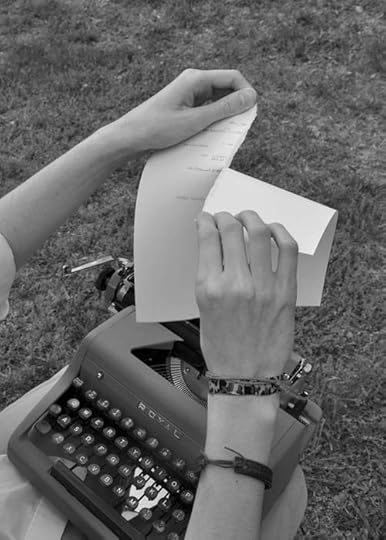
I’m having a challenging time writing during this Frenzy and I wasn’t sure why until I had a quick chat with our ED, Grant Faulkner. This year I decided to write a feature that is comprised of four shorts linked together by a river. I thought it would be a snap because in my mind it meant that I would avoid the stormy seas of writing the second act of a traditional script. I was wrong. Every single time I sit down to write I feel stuck, and I can’t help but feel a little defeated.
When I mentioned this to Grant he pointed out that it’s probably harder to write four short films than it is to write a 100-page script because I would have to write four beginnings, four middles, and four endings. Bells and whistles went off in my head when I heard those words. In essence I’m doing four mini-Script Frenzy’s this April. I guess it means that I’m a “superstar!” (Said in the voice of Mary Katherine Gallagher.)[[MORE]]
While this realization doesn’t make the Frenzy any easier for me, it does shed light on why I’m feeling stuck. Taking on such an ambitious task has ruffled my inner critic’s feathers, and when my inner critic’s feathers are ruffled, its voice gets really loud. This voice has triggered my perfectionist streak, and now, every line of dialogue I write and every scene I set up just makes the rest of my script seem wrong.
The author Julia Cameron explains in her book, The Artist’s Way, “The perfectionist fixes one line of a poem over and over—until no lines are right.” She also says, “The perfectionist writes so many versions of scene one that she never gets to the rest of the play.” This is exactly what I’m doing, and since I intend to reach my 100-page goal by April 30th, I’ve decided to start using a technique called the “Morning Pages” that she mentions in her book. It’s a technique that helped keep me writing in the past and I’m banking on it working now.
It works like this:
Buy a spiral notebook and a pen (we’re kicking it old school).
Put them beside your bed.
When the alarm goes off in the morning, grab your notebook and pen and fill three pages of longhand writing with whatever comes to your mind (pure stream-of-consciousness).
When you’re done close the notebook and place it back on your nightstand (don’t go back and read what you wrote).
Nobody is allowed to read your pages except for you (wait six months before you read them).
I’ll let you know how it goes. In the meantime, I’d love to hear about techniques you use when you’re feeling stuck!
Photo by Flickr user Alyssa Murkin
April 16, 2012
Perfecting My Writing Workspace

Last night after finishing all of my readings for school I decided to put off writing my script (AGAIN!!) by meticulously cleaning and organizing my bedroom. I live in a very old and extremely strange Berkeley apartment that’s pretty much two bedrooms and a bathroom connected by a narrow hallway with an oven, sink, and refrigerator crammed into it. It is in no way the nicest place I’ve ever lived but as my roommate says, “It’s a one star apartment that we love.” But since we can’t really hang out in our hallway, I end up spending a lot of time in my room so it’s very important to me that it’s clean and comfortable enough for me to eat, sleep, study, and hang out with friends in. But with Script Frenzy upon us, I’m trying to take it a step further by converting my modest bedroom into a chamber of creativity. [[MORE]]
I have begun to make my room writing-friendly by eliminating distractions: these include the silly putty in my top drawer, fun clicky pens and highlighters, and the miscellaneous junk that covers my desk. After clearing the mounds of crumpled Post-its off my desk, I replaced all of my used-up candles with fresh ones and arranged them in a visually pleasing manner. Then I vacuumed all of the hair from my carpet, dusted my bookshelf, and attempted to rearrange my pile of shoes into a slightly neater pile of shoes (something I repeatedly attempt but still haven’t mastered).
Once my room was spotless, candles were lit, and the good energy was flowing, I began to work on amping up the inspiration. I tacked up a couple of pictures of literary bad-asses that inspire me and promoted my framed picture of manatees to the premier wall space above my desk. It may seem strange to hang a picture of two manatees holding fins next to a portrait of Susan Sontag but it just looks right to me. After the visual inspiration was covered, I crafted a playlist of my favorite instrumental music to listen to while I write. Unable to think of any other ways to improve my new workspace, I proceeded to fall asleep without working on my script at all.
Now that my bedroom is in tip-top scriptwriting shape, I hope that I have finally run out of excuses not to write. But we’ll see. Who knows, I might wake up tomorrow and decide that I can write an Oscar-worthy screenplay only if I throw a new coat of paint on my hallway kitchen.
How much time do you waste rearranging your candles? What does your workspace look like?
-Jessie
Photo by flickr user mcbfly
Chris Baty's Blog
- Chris Baty's profile
- 63 followers



